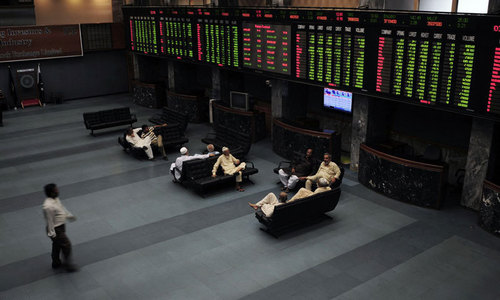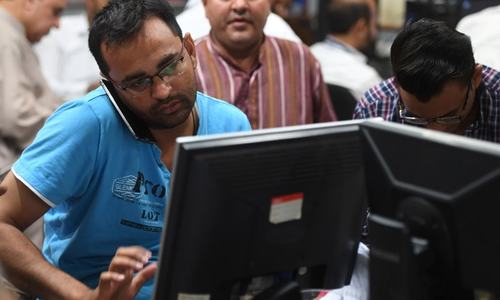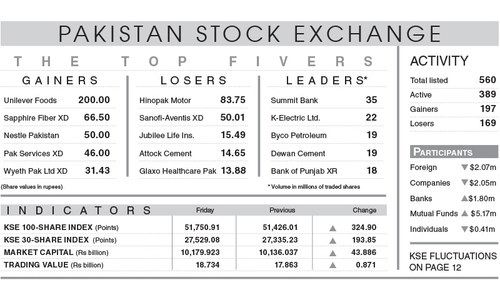KARACHI: Investors’ wait was finally over around 3am on Tuesday when MSCI announced the upgrade of Pakistan’s status to the emerging market (EM) from the frontier market (FM) in its semi-annual review.
The reclassification will be effective from June 1. The excitement over the reclassification has been built on the premise of greater inflows of funds from global investors, which have a staggeringly huge investible pool of $1.5-$1.7 trillion for the emerging market.
Most market strategists and fund managers expect inflows of $300-$500 million into the Pakistani equity market from global players who invest through EM index funds. “Out of the total funds tracking the MSCI EM, around 20pc amounting to $300bn are passive funds. This results in gross inflows of EM passive funds of around $300m based on Pakistan’s expected weight of 0.1pc in the MSCI EM index,” say analysts at Topline Securities.
The Pakistan Stock Exchange (PSX) mimicked the reaction of Dubai and Qatar equity markets, which rallied 90pc and 46pc, respectively, between the MSCI inclusion announcement on June 11, 2013 and the actual inclusion on June 1, 2014.
Many pragmatists suggest that the expected inflows of $300-$500m are unlikely to flood the PSX immediately after June 1. Near-term inflows from the reclassification can be about $80m. Incidentally, Pakistan’s weight in the index has been reduced to 0.10pc against the original 0.19pc pro-forma weight calculated at the time of the decision to reclassify the country into the EM. It was a ‘negative surprise’, according to Muhammad Fawad Khan at BMA Capital Management.
Six companies that qualified for the main index include United Bank, Habib Bank, Lucky Cement, Oil and Gas Development Company, MCB Bank and Engro Corporation.
Hub Power, Pakistan State Oil and Fauji Fertiliser were re-located to small-cap stocks against the earlier decision to include them into the main index.
Two surprise additions to the original qualified stocks include D.G. Khan Cement and Thal Ltd. Another 27 companies have qualified for the inclusion in the MSCI EM Small Cap Index. These include Bank Alfalah, Engro Fertiliser, Fauji Cement, Fauji Fertiliser Bin Qasim, Fauji Fertiliser, Ferozsons Laboratories, Honda Atlas, Hub Power, IGI Insurance, Indus Motor, International Steels, D.G. Khan Cement, Kot Addu Power, Maple Leaf Cement, Millat Tractors, National Bank, National Refinery, Nishat Mills, Packages Ltd, Pak Elektron, Pak Suzuki, Pakistan Oilfields, Pakistan State Oil, The Searle Company, Shell Pakistan, Sui Northern Gas Pipelines and Thal Ltd.
The list reveals eight surprise additions: Engro Fertilizer, Honda Car, International Steels, D.G. Khan Cement, National Refinery, Shell Pakistan, Sui Northern Gas Pipelines and Thal Ltd.
The MSCI Pakistan Index will have a pro forma weight of 0.14pc in the MSCI EM index, based on the data of April 20. The MSCI says that Pakistan will remain in the MSCI Frontier Emerging Market (FEM).
According to MSCI, if a country is reclassified from FM to EM, it will be deleted from the MSCI FEM index only if the country’s weight in the MSCI All Country Weight Index (ACWI) is above 20bp. So market experts interpreted that Pakistan has been upgraded to EM, but it will effectively remain in both, until its weight improves.
Pakistan was part of the MSCI EM Index from 1994 to 2007. However, the imposition of the infamous ‘floor’ on the then Karachi Stock Exchange 100-share index during the global crisis of 2008 did not find favour with foreign investors. They stampede out of the market and the MSCI downgraded Pakistan from the EM to standalone and, a year later, FM category.
Published in Dawn, May 17th, 2017













































